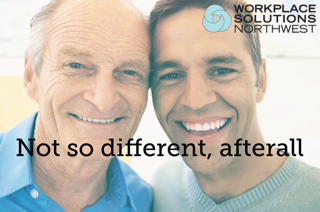
We’ve all heard that Millennials aren’t loyal, they don’t like to work hard and they love innovation and change. We’ve heard they prefer technology to people and they can’t stand being told they aren’t perfect. Like with almost anything else, you can even probably find some surveys which state all of these things.
But what is actually true? Since Jennifer Deal wrote Retiring the Generation Gap: How Employees Young and Old Can Find Common Ground, the idea that the different generations really aren’t so different after all has taken more root in the popular culture. In fact, there are many different studies which show it’s not so much how the generations differ in their values, but rather how those values are expressed. For example, a Boomer who values family might express that value by working long hours to support the family. A Millennial might express that value by spending more time with the family. But they both value family.
In fact, we’re finding out what divides us is much more often our mistaken stereotypes about each other rather than our differences. We have a very human tendency to make up reasons why other people do things differently than we do, and then to decide (a) that we’re right; and (b) that everyone who has a similar characteristic (age, race, sex, religion, etc.) is also probably the same. We don’t just apply this across generations, either.
We do this sort of thing because we often make decisions heuristically — meaning, we come up with an answer that seems less wrong than other alternatives, and so we go with it, often unconsciously. If someone is different from who we are, we come up with some sort of gut reaction about why they are different and then we label them with the reaction. For example, a younger person doesn’t make great eye contact and sends us an email rather than talks face to face. An older person takes this as a sign of disrespect and decides the younger person is disrespectful to older people and can’t communicate face to face. Then we extrapolate this gut reaction to label people in said person’s whole generation as disrespectful. Another and probably truer explanation is that respect or lack of respect is not a factor at all.
There is quite a bit of research showing different generations value similar things at work. For example, in Age and Generational Differences in Work Psychology: Facts, Fictions and Meaningful Work, Paul Fairlie suggests age and generational differences have been overstated in the popular literature and some of those differences might be better explained by life span models of development. This means if Millennials are more interested in developing their careers (e.g., in training and mentorship), this is probably explained by where they are in their life span. At the beginning of their careers they need training and development in the fundamentals. Baby Boomers might be more interested in flexibility and help as they care for their aging parents, but less interested in child care benefits.
And finding meaning at work? There are studies going back decades indicating employees value meaning in their work. In other words, it isn’t just the Millennials who care about meaningful work and it never has been. Perhaps this generation is just more willing to say what they want, as did Elizabeth McLeod in Why Millennials Keep Dumping You: An Open Letter to Management.
But this doesn’t mean there aren’t some differences in how we are, generationally. All it means is that we need to get to know each other as people rather than as labels. Social psychology research does tend to show we have stereotypical views of each other. But Fairlie suggests once those perceived differences are minimized, we can come to grips with the actual differences on cross generational teams.
How do we do this? By understanding that almost everyone wants meaningful work, autonomy, relating with others and the ability to exercise their skills competently. We might better connect our employees with our customers so the employees have a better sense of how their work makes a difference in the customer’s life. We might better connect our employees with the societal or environmental benefits of our work. We might make teams a way of getting things done so people connect with each other as they do their work. Most importantly, we need to ask people what they value and respond to what our employees are saying.
Whenever we say something like, “they’re just like that” referring to an entire group of people somehow possessing the very same characteristics, we’re in stereotype-land — not reality. What unites us is always more than what separates us, and this is also true across generations at work.
OCT